Oldest human record not broken for 28 years – are we making any progress with maximum lifespan?
Will Jeanne Calment’s record 122 years ever be broken?
Join the club for FREE to access the whole archive and other member benefits.
What if we cured ageing today? And by “cured” I mean stopped. Nobody got any older. Biologically speaking, if you’re 30 today, in a year’s time, your body is still 30 years old. Does that mean you would live forever?
There are many ways of defining ageing, and even more theories on why we age, but here is a typical scientific one by Michael R. Rose:
Aging is a progressive decline in physiological function, leading to an age-dependent decrease in rates of survival and reproduction.
Basically, as we get older, our physical and mental abilities decrease, and we are at a growing risk of disease and death.
Your mortality (the chance of dying in a particular year) increases exponentially. Roughly speaking, your chance of dying doubles every 8 years. You may remember during the covid pandemic the curve showing an exponential increase in risk of death from coronavirus infection – but that applies to all causes of death too.
Here is a graph showing the chance of someone in the UK dying at a particular age. After the risk of being born and early development, the chances of dying drop to about 1 in 10,000 (0.01%) each year in someone’s mid-teens and is 1 in 1,000 (0.1%) by mid-30s. These early decade changes are hard to see on this scale, but the risk is increasing more and more every year, and this becomes much more visible later in life, when the risk of death is 1 in 100 at 65 and just 1 in 10 at 87 years old.
Did you know that the chance of a new born making it to 83 years old (50%, by definition life expectancy) is the same chance as an 83-year-old making it to 90? That's the power of exponential growth in mortality.
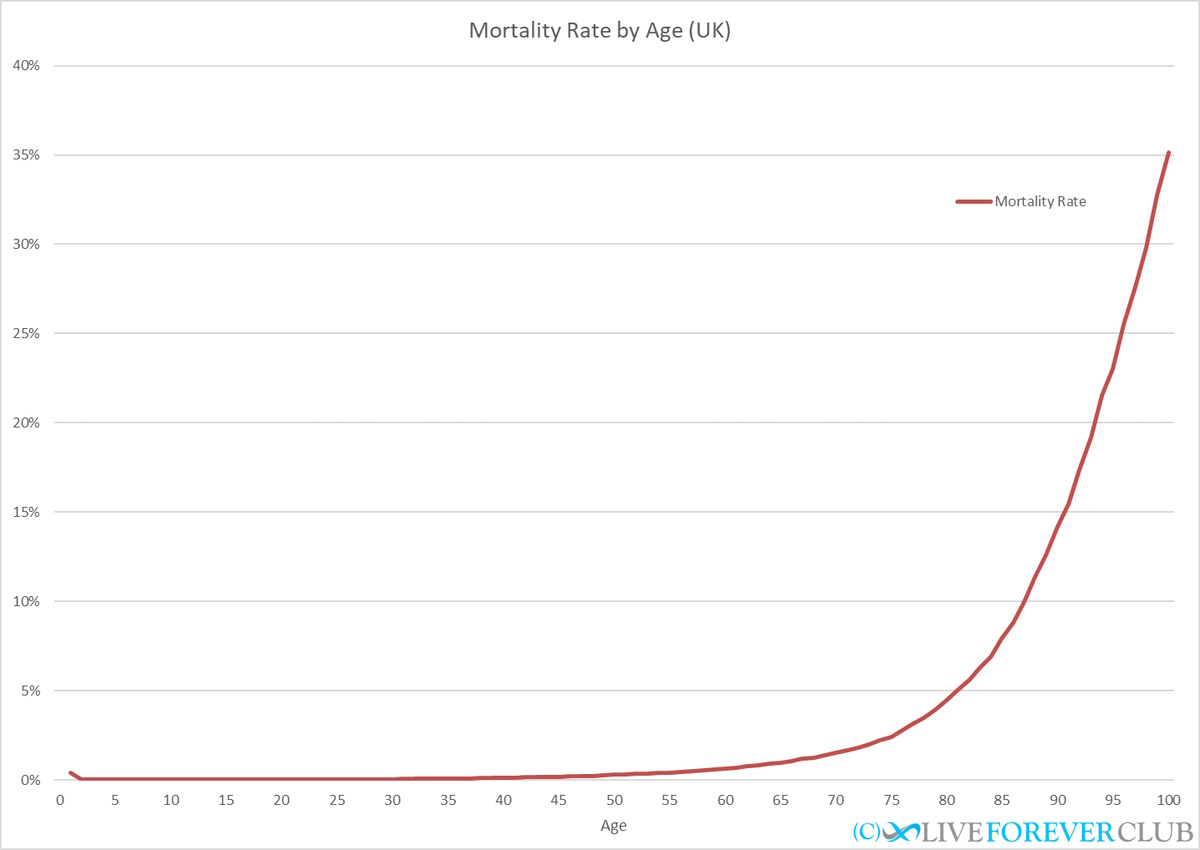
Mortality Rate by Age (UK)
But a quick reminder of what exponential growth means – the rate is changing by the same percentage each year. So if you zoom in on the graph you will still see the same general shape (though not quite as smooth). For example, in the graph above there seems to be negligible change between 20 and 45 – or, at best, the slightest of gradient of a straight line. Here is that “straight line” zoomed in (with a different scale):
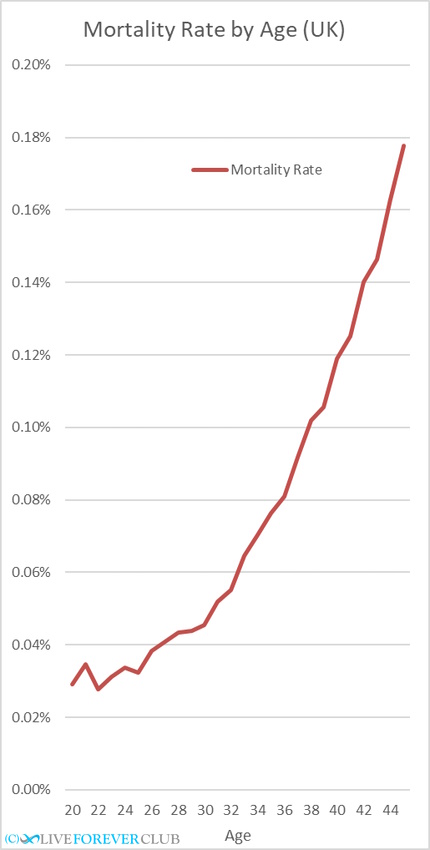
Mortality Rate by Age (UK) - ages 20 - 45
Mortality increases exponentially whatever the scale you look at!
Life expectancy is the age that half the people in the population would reach when born, assuming they experience the same year-by-year mortality rates as observed in people in their year of birth. So, in reality, assuming life expectancy continues to increase, they’re likely to live even longer than that. This is because, for example, by the time they reach 60, the mortality rate of 60-year-olds will have dropped so they will experience lower mortality than forecast at birth. The usual life expectancy, as used in the calculations in this blog are called period life expectancy because the calculation uses all of the rates for a specific period (2020 statistics in this case). The alternative approach is cohort life expectancy, as it as if you followed someone through their life and adjusted the mortality rate they actually experienced (or predicted to experience).
Life expectancy often refers to life expectancy at birth, but every year you survive, you didn’t die like some people, so you should now live a little bit longer. Think of it that the chance of you being alive is your chance of living to 1 multiplied by the chance of living to 2, then to 3, 4, 5, etc. When those multiplications equal 50% (or 0.5) then that’s your life expectancy. So, if you make it to 20 then you can remove the first 19 multiplications from that equation meaning your chance of being alive at, say 80 years old, pops up a little bit.
However, this has a surprisingly small effect for the first five decades of your life, as nowadays almost everyone makes it to 50. So, surviving to 50 years old has hardly any impact on your life expectancy because you were so unlikely to die before then anyway.
The graph below plots your life expectancy against your current age. Using 2020 life tables (statistics), life expectancy at birth (male and female combined) is 83.7. To increase that by a single year you have to wait until you turn 60. By the time you beat the odds and make it to 84, you’ve now gained another 6 years life expectancy – that is, on average, an 84-year-old will live to 90. Eventually, age and life expectancy meet as your chances of surviving one more year are so low, basically around 101 years of age.
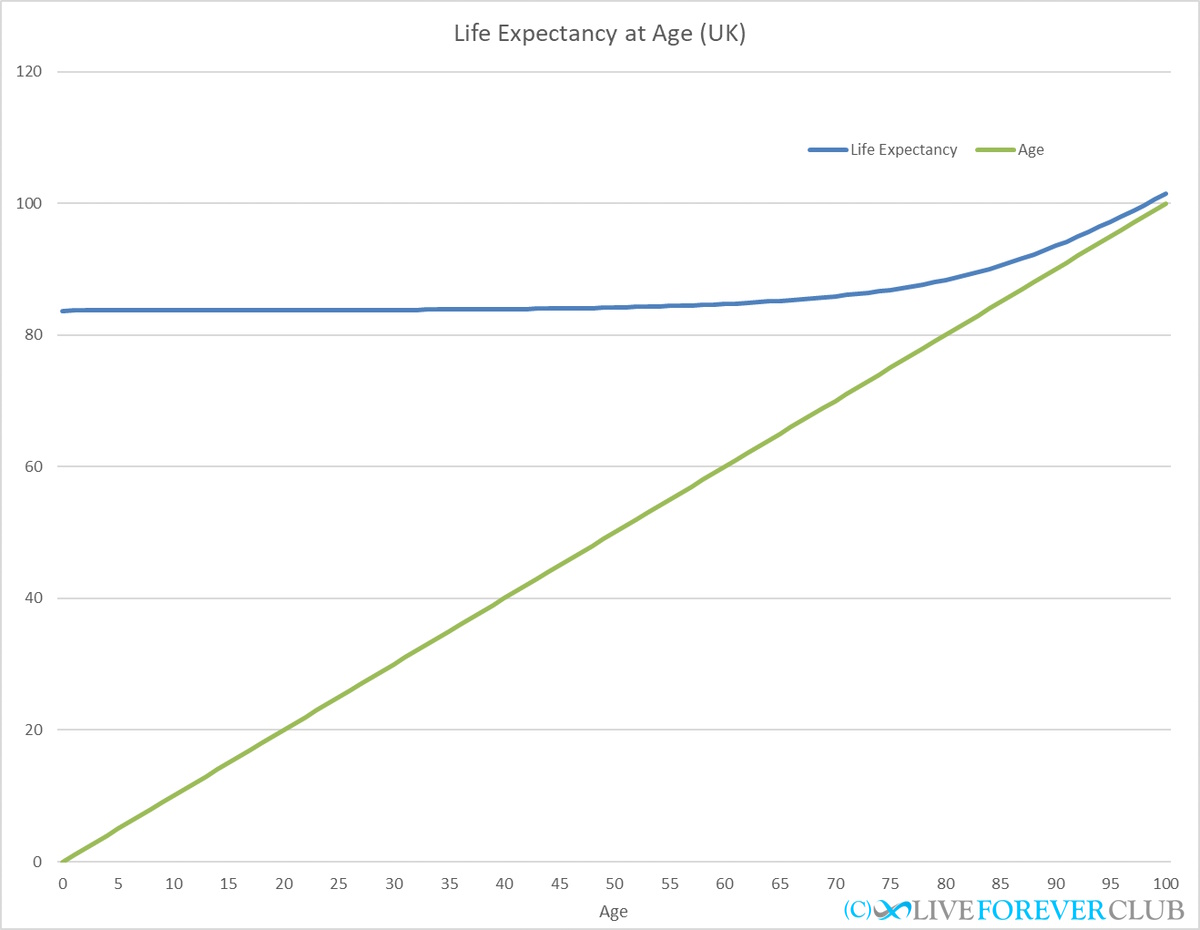
Life Expectancy at Age
From the graph above, we can see that being lucky in life (and/or putting a lot of effort into a healthy lifestyle!) only increases life expectancy by a few years. But what if we could slow down ageing, what impact would that have?
Surprisingly little. I adjusted the mortality rate in the 2020 life tables by different percentages to see how much life expectancy at birth changes if, after 20 years old, mortality rates were reduced.
For example, slowing aging by 20% increases life expectancy by a measly 2 years, and a 50% slow down only extends it by 6 years. Disappointingly, even slowing down ageing by 90% only increases life expectancy by 22 years to around the same as today’s maximum lifespan. I’ve plotted this in the graph below: slowing down ageing more and more moving left to right, with increased life expectancy shown in blue.
This is because although 90% is a big reduction, when a curve is exponential and we see the rapid increase in mortality, then even reducing this by a certain percentage still results in a rapidly increasing curve.
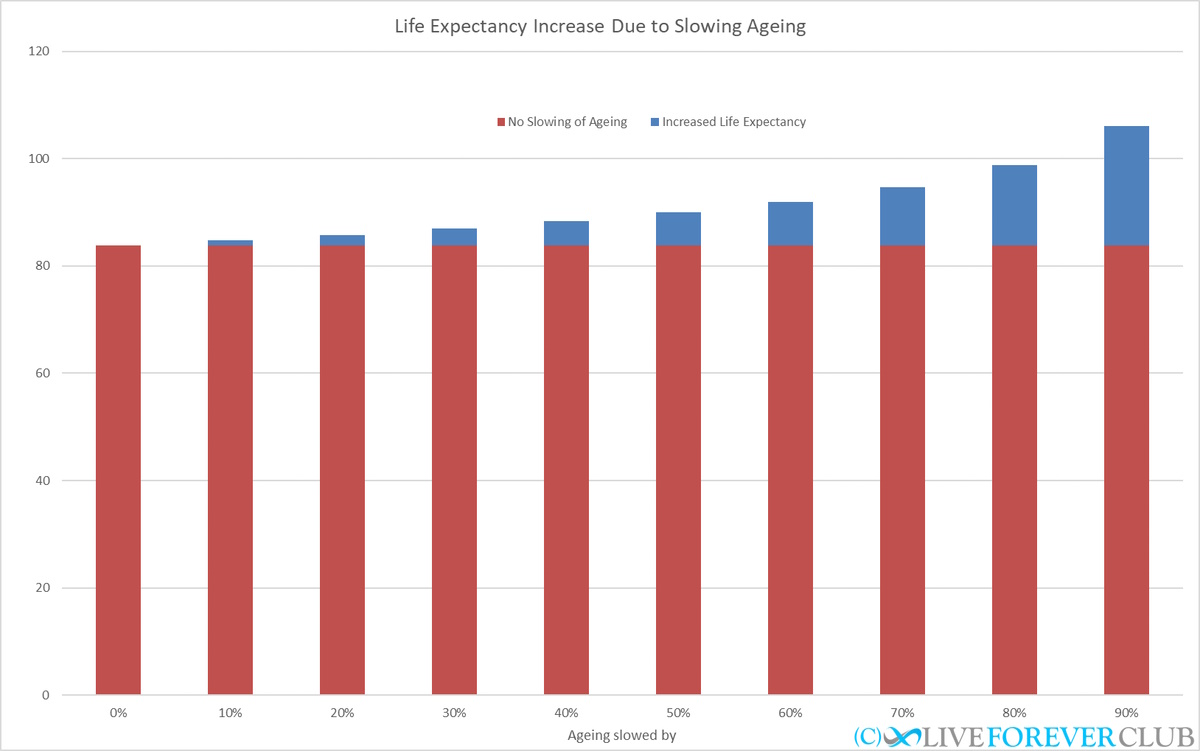
Life Expectancy Increase Due to Slowing Ageing
So, coming back to the question of how long you would live if you stopped ageing. The key point is that it’s not the “getting older” that matters, but “being older.”
If someone aged 87 stopped ageing, they would continue to have a 1 in 10 chance of dying every year, giving them a life expectancy of 93.6. This is still better than 91.6 if they had continued to age but not radical life extension.
Now let’s look at that 30-something, with a 1 in 1,000 chance of dying – if that mortality rate is frozen (so their chronological age increases but their biological age doesn’t) that would result in, instead of a normal life expectancy of 84, on average living to over 700. And stopping ageing at 20 gives a life expectancy of around 2,400 years… and, of course, half the people would live even longer than that!
The graph below shows the life expectancy of people if they stopped ageing at different ages starting at 20. The red portion displays normal life expectancy at that age, with blue indicating how much longer people would live if they didn’t get any older biologically (that is, their chance of dying didn’t increase every year).
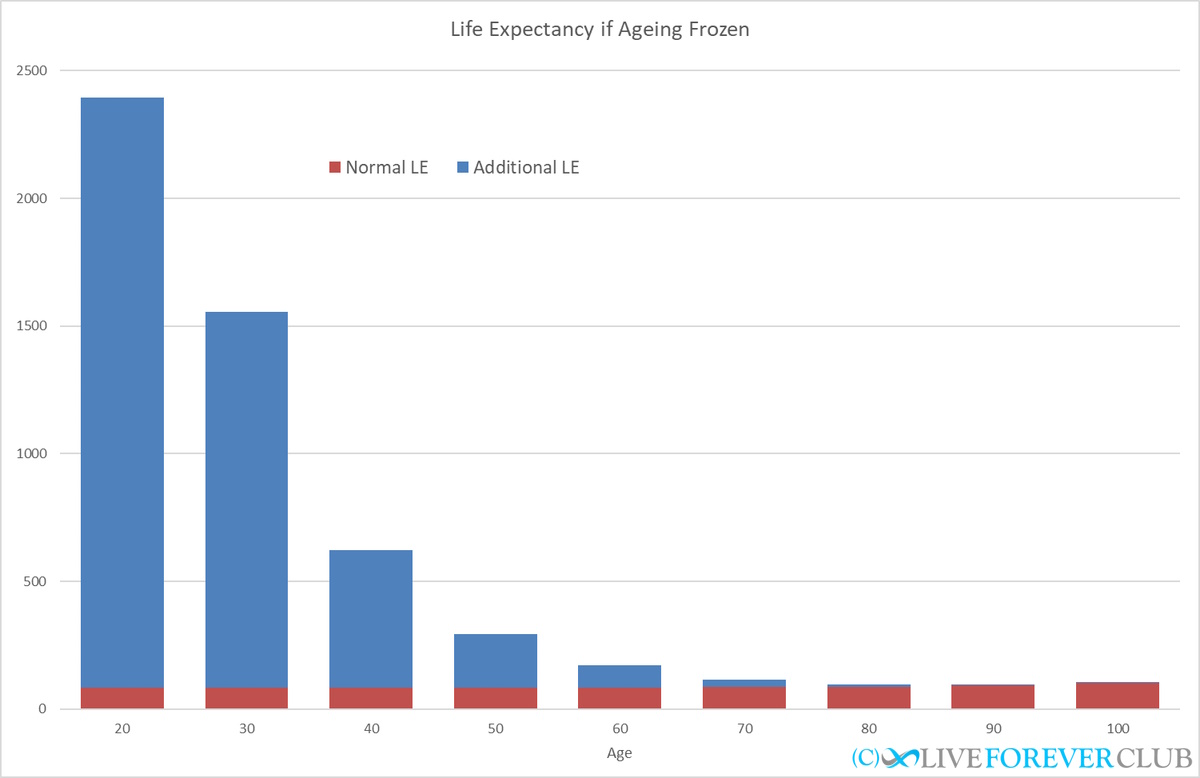
Life Expectancy if Ageing Frozen
To make a big impact on the older generations (and by that, I mean over 50s, like me) we really need to reverse ageing. That means rejuvenating the entire body (including the brain) at a cellular level back to how it was at 20 years old. Removing all the damage and debris that has built up over that time. If we were a car, then reverting back to showroom condition, ready to rollout gleaming with engine, brakes and gadgets all working perfectly.
Is that possible? Scientists are already working on it, by clearing out senescent cells, reprogramming aged cells to behave like younger ones and designing enzymes to clear up damage (such as arterial plaques) that the body can’t handle itself. There’s no physical law saying we can’t do it, and with the exponential growth in computing and our medical knowledge, we’re getting there faster and faster.
In practice, this scenario is likely to require regular rejuvenation treatments. After a few initial sessions to get your biological age down to 20, so that you have the mental and physical agility of someone that age, it will then be into maintenance mode. You go to a longevity clinic (which will be wildly more advanced than today’s wellness-based longevity clinics) and undergo the appropriate (very personalised) rejuvenation treatment which will reduce your biological age by a year. A year later, you go back and receive another treatment (which even for you, may tackle totally different issues than last time) which pushes your biological age back a year again. So you live your life, indefinitely, with a biological age of 20.
Realistically, indefinitely may not mean forever. You could still get hit by a bus or caught up in a natural disaster – we’re talking about stopping ageing not fictional immortality. Though, with improving technology outside of the healthcare world, the risk of these scenarios should drastically reduce too. So maybe not forever, but still a very, very long time.
Which is why the next graph shows an almost straight line. If the life expectancy axis wasn’t zoomed in then it would be hard to see the difference. But basically, life expectancy would be that of a 20-year-old who no longer ages, with a few extra years for the years spent prior to their rejuvenation. Everyone, no matter how long they had lived, would have the same life expectancy – and it would increase year by year every year that you live. It’s a strange concept, but your how many years you have left to live (your thanatological age) doesn’t change if ageing is stopped.
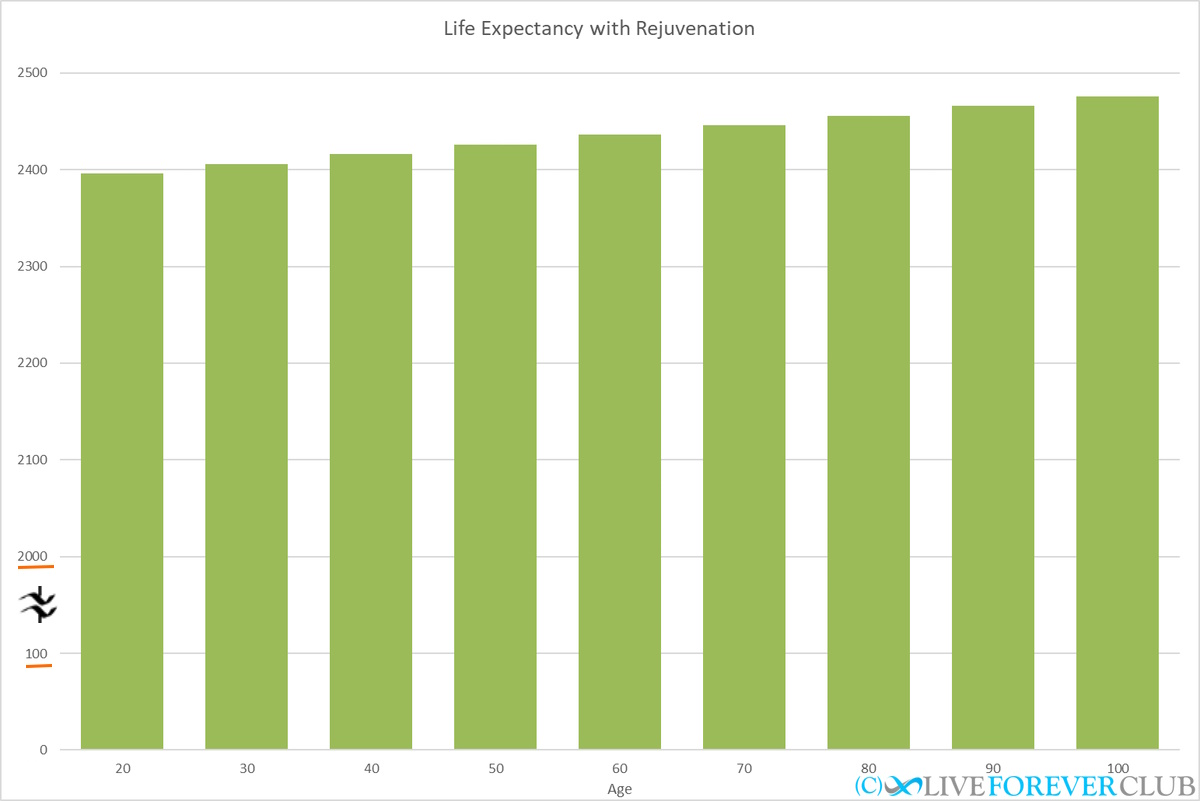
Life Expectancy with Rejuvenation
Let’s summarise what we’ve discovered:
So, does stopping ageing mean we can live forever? Definitely not. But reversing it makes it a possibility, as by the time you’ve lived over two thousand years, who knows what technology will allow us to do by then?
Blog written by Adrian Cull.
Past and projected period and cohort life tables: 2020-based, UK, 1981 to 2070 - Office for National Statistics (ONS)
Monitoring my blood glucose response with a Freestyle Libre 3 CGM
General Election 2024 Longevity Policies
Will Jeanne Calment’s record 122 years ever be broken?
Has this century seen extraordinarily long-lived Wimbledon champions, or are winners over 30 years of age the new normal?
The data and science behind the exponential growth in mortality with age
Survival curve shows increase in average lifespan, and now Sima has become the longest-lived Sprague Dawley rat
Health and life expectancy are affected by love, sex and marriage